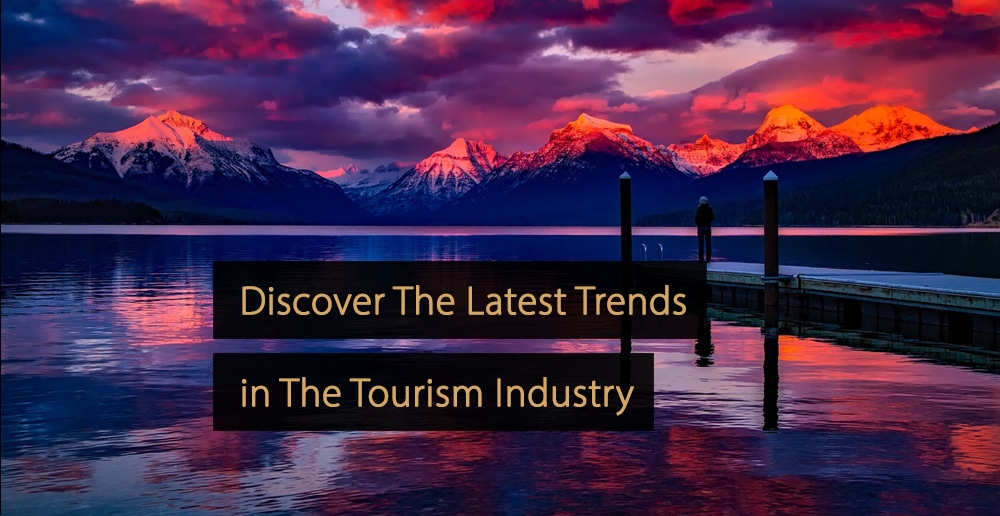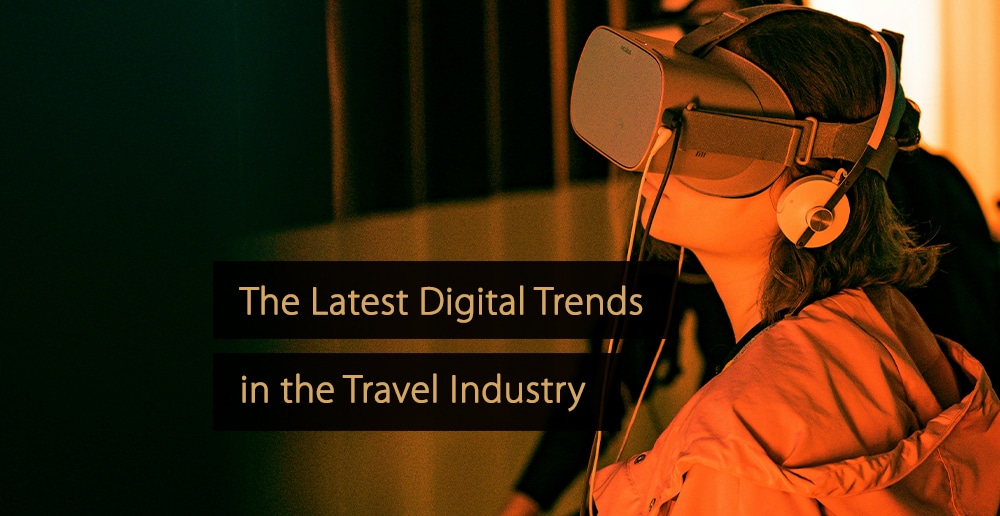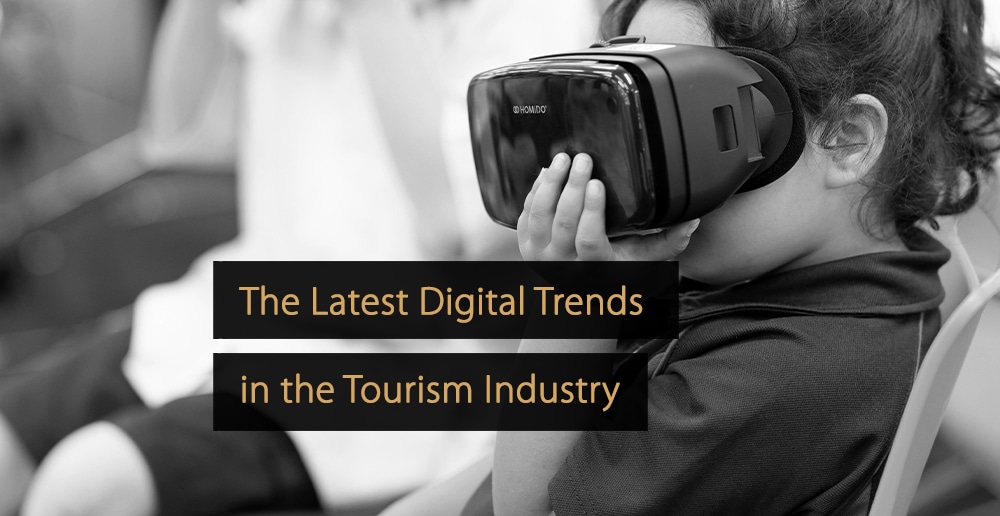New trends and innovations continually disrupt industries, and the tourism industry is no exception. Keeping pace with these emerging tourism trends can help businesses stay competitive and cater to customers’ needs. Some of these trends have been a direct or indirect result of the COVID-19 pandemic. Read on to learn more about the key trends within tourism for 2025.
Table of Contents:
- Keeping up with the Latest Tourism Trends: Why It Matters to Your Business
- The Factors Responsible for Upcoming Tourism Trends
- 25 Opportunities and Tourism Trends for 2025
- 1. Wellness & Retreat Tourism
- 2. Solo Travel
- 3. Eco Travel
- 4. Local Experience
- 5. Transformative Travel
- 6. Sleep Tourism
- 7. Personalization
- 8. Indigenous Tourism
- 9. Healthy and Organic Food
- 10. Nostalgic Travel Options
- 11. Safety & Hygiene Tourism Trends
- 12. Artificial Intelligence
- 13. Robots, Chatbots, and Automation
- 14. Internet of Things (IoT)
- 15. Recognition Technology
- 16. Voice Search & Voice Control
- 17. Growth of Contactless Payments
- 18. Customer Experience 2.0
- 19. Virtual Reality Tourism Trends
- 20. Augmented Reality (AR)
- 21. Virtual Reality & Metaverse Travel
- 22. Bleisure Travel
- 23. Immersive Cultural Stays
- 24. Set-Jetting
- 25. Celebratory Travel
- What Are the Biggest Tourism Trends Related to Marketing?
- What Are the Biggest Tourism Trends Related to Technology?
- Learn More About Tourism Trends Through Tourism Courses
Keeping up with the Latest Tourism Trends: Why It Matters to Your Business
Whatever aspect of the tourism sector your business is involved in, you need to keep your finger on the pulse. Formerly beloved concepts and products go out of style, replaced by more modern elements that capture more of the market. New destinations, new technologies, and means of transport have caused major shifts in the industry. Early adoption of new trends is vital.
The Factors Responsible for Upcoming Tourism Trends
A trend can be defined as a generalized change in a situation or behavior or a general direction in which things are transpiring. Several developments in tourism have led to changes in consumer behavior and business processes, meaning they are responsible for emerging tourism trends.
One of these developments has been a fundamental change in technology use, especially in artificial intelligence and machine learning. This has led to the increased adoption of robotics and AI-powered technology in hotels. It has also led to changes in customer behavior through the rise of voice control and search.
After the COVID-19 pandemic, travelers still focus more on hygiene and safety, needing contactless payments and remote working. Meanwhile, environmental concerns have added to the local-first approach of many customers and have given rise to trends related to organic food and eco-travel.
25 Opportunities and Tourism Trends for 2025
Following the current tourism trends in response to increasing consumer actions due to the coronary pandemic is essential. However, most patterns have arisen from more general shifts in customer behavior. Below, you can see both general hospitality developments and ways to respond to the coronavirus pandemic. There are various tourism trends based on more general changes in consumer behavior, like the need for healthy and organic food & drinks, sustainability, personalized service, the rising demand for digitalization, and the use of technology.
1. Wellness & Retreat Tourism Trends
Few tourism trends are growing as rapidly as wellness and retreat tourism, according to the Wellness Tourism Market research report by Fact.MR, the global wellness tourism market is expected to reach $2.3 trillion by the end of 2033. This kind of tourism can be described as being primarily motivated by self-improvement. It typically involves traveling in a way that contributes positively to a tourist’s physical and mental health or knowledge and awareness.
Wellness and retreat tourism takes many forms, from visiting meditation retreats or yoga retreats to staying at health spas or healthy eating retreats. In the past, vacations were often seen as a time to let go and indulge in food and alcohol, but many modern tourists actively seek trips to escape everyday temptations.
Example: Tapping Into The Wellness Tourism Boom
2. Solo Travel
Leisure travel was a family affair or something that couples undertook together. While that’s still the case for many, more and more people are choosing to strike out on their own. Enjoying a solo trip is no longer so unusual, and tourist trends increasingly reflect this. The needs of solo travelers are diverse.
Some want to travel without the distraction of a companion. Others are young singles looking for social activities or to find a partner. Some widowed seniors even use long-term hotel stays or cruises as a luxurious alternative to conventional elder care. These tourism trends are set to grow and grow.
Video: 15 Perfect Destinations For Any Solo Traveler
3. Eco-Travel
The concerns and mores of the customer base heavily influence tourism trends. As a new generation becomes increasingly relevant in the marketplace, the ideals driving their purchasing decisions create new tourism trends. Eco-travel is just one example of these tourism trends, reflecting a growing concern among today’s travelers for ethical and sustainable tourism options and is only growing. According to the Ecotourism Global Market Report 2023 by Research and Markets, the global ecotourism market is expected to reach $331.62 billion by 2027.
Eco travel includes simple changes, such as the availability of carbon credits when booking a flight or the option to rent an electric instead of a conventional vehicle. More sophisticated examples might include tourism with a volunteer element, perhaps working on a nature reserve or engaging in conservation work.
Video: Ecotourism – A Sustainable Way To Travel
4. Local Experience
Today’s tourists don’t want to be insulated from the places they visit inside a cultural bubble. They want to engage with and participate in the local culture. From enjoying local cuisine to celebrating regional festivals and holidays, local experiences are set to become some of the top tourist trends to watch.
One example of a popular local experience would be visiting Japan during a major festival, renting formal Japanese clothes to wear, consuming regional delicacies, and engaging in traditional games or cultural activities. Another might be a long stay with a host family in the destination country to learn more about the local culture.
Video: A Local Travel Guide of Amsterdam
5. Transformative Travel
Transformative travel, or transformational travel, is one of the major tourism trends gaining traction at the current time and describes trips that are intended to inspire growth and create lasting change in a person. A strong emphasis is placed on learning, gaining new perspectives and making lasting lifestyle changes.
Many transformative travel experiences are organized by companies in the tourism industry and connect people from different cultures, so they can exchange customs and ideas. This form of travel is often connected to ideas like religious tourism, ecotourism and sustainable tourism, but with a stronger emphasis on self-improvement.
6. Sleep Tourism Trends
Like wellness and retreat tourism trends, sleep tourism is a rapidly growing area of the tourism industry. As the name indicates, this kind of tourism places a strong emphasis on sleep. The aim of sleep tourism is to gain high-quality sleep in sufficient quantity and return from the trip well-rested and ready to tackle everyday life.
Again, this kind of tourism can take many different forms. Some sleep tourism destinations focus on meditation, while others prioritize soundproof rooms, an absence of technology and distractions, or rooms where light can be fully blocked out. Service providers tend to invest heavily in great beds, duvets, and pillows.
Example: Sleep SPA Tourism
7. Personalization
You’re probably familiar with those ads that pop up on social media and certain other websites, ads related to things you’ve looked at or purchased online. This is just one example of personalization. As well in marketing tourism more effectively, personalization can apply to every aspect of the tourist experience.
Today’s consumers expect experiences that closely match their preferences, from destinations to accommodation and activities they’ll engage in. The more closely an experience can be tailored to a client’s desires and expectations, the more likely they are to return and use the same service again.

Matthias Dybing, Co-Founder & Director at Nuvho“Personalization ranks among the most important tourism trends to focus on, but the modern popularity of third-party booking platforms hinders personalization efforts. This creates a divide between direct bookers and indirect bookers, even though customers are usually unaware of the difference between the two approaches. Most hotels want to reward customers for making a booking rather than direct bookers for choosing the right method. Yet, with third-party bookings, pre-arrival communication is often restricted, and data is often retained by the third-party platform, not your hotel. To achieve the best customer experience, hotels, and third parties must agree to share information that will ultimately benefit the customer through improved personalization.” Click here to read more revenue management tips from our Hospitality Expert Panel. |
Video: Personalized Marketing by Nicole Martin
You can read more detailed information and examples of personalization marketing in tourism in the article “Ways Personalization Marketing is Used in the Tourism Industry.”
8. Indigenous Tourism
Many emerging tourism trends are geared toward making tourism more ethical and less harmful. Another example is the growth of indigenous tourism, which can be described as tourism experiences owned and operated by indigenous people. This helps to ensure these people benefit most from the tourism in their area.
For tourists, indigenous tourism provides exciting opportunities to take on new experiences in a way that is completely authentic. These experiences could involve staying in traditional accommodations, eating traditional foods, experiencing life in remote locations, or temporarily living as indigenous people live.
Example: Indigenous Tourism Industry
9. Healthy and Organic Food
Healthy food and the kind of fare consumed by tourists used to be antonyms in the minds of many travelers, with holidays traditionally representing a chance to break one’s diet and indulge in forbidden treats. Today’s travelers know that delicious and nutritious are not exclusive concepts.
Demand for excellent cuisine with a view to better nutrition drives new tourism trends. Modern tourists want to know that their food is as healthy as delicious. The organic food movement also affects tourism trends, with more eateries and hotels offering organic options. Other special diets are also represented.
Video: Organic Holiday in Italy
10. Nostalgic Travel Options
Tourism trends are also increasingly being impacted by a generalized thirst for nostalgia among the public, and nostalgic travel options represent a significant opportunity for businesses. Nostalgia can inform travel decisions in several ways, such as a longing for simpler times and encouraging travelers to book trips to remote locations.
Alternatively, nostalgia could see travelers focus on domestic trips, particularly on places they visited when they were younger. Some travelers may also focus on destinations with which they have a long-established connection, such as through films they have enjoyed, video games they have played, or music they love.
11. Safety & Hygiene Tourism Trends
Whether it is airlines, cruises, hotels, restaurants, or bars since the outbreak of COVID, safety, and hygiene standards have been paramount. With this in mind, several tourism trends are related to this, such as increased cleaning, socially distanced seating, providing hand gel, and enforcing masks in some settings.
This is also now a vital part of tourism marketing, with companies needing to clarify their hygiene and safety policies and measures to keep customers safe. The threat of COVID has meant people are more reluctant to travel and visit tourism hot spots, so they must be persuaded that it is safe.
The “Hygiene is the New Marketing Message for Hotels” post explains this trend in more detail.
12. Artificial Intelligence
As well as the aforementioned chatbots, artificial intelligence is becoming increasingly important to the tourism industry. Machine learning technology is now firmly entrenched in the marketing of the tourism sector, with AI helping to personalize the experience of finding and booking tours and trips.
AI is also increasingly valuable in contexts such as smart hotel rooms, identifying the likely needs of guests and fine-tuning the environment and services to fit the guest’s needs and preferences. Artificial intelligence is finding applications everywhere, from customer service to security. Future AI tourism trends to watch out for might include self-driving vehicles and virtual guides for tourism.
Video: AI for Marketing & Growth
Video: Example Hotel Chatbot
Find more detailed information and examples of artificial intelligence use cases in the tourism industry in the article “How Artificial Intelligence is Changing the Travel Industry.”
13. Robots, Chatbots, and Automation
One of the more eye-catching examples of these particular tourism trends is Connie, the Hilton Hotel chain’s robot concierge. Other hotels have also got in on the robot-staff trend, installing interactive robots to handle certain reception duties or even having them serve food and drink to visitors.
However, this kind of novelty application is far from the only one. Many customers now book their travel and accommodation with the help of internet chatbots, specifically tailored AI, which can handle queries and assist customers with useful information when human operators are unavailable.
Video: Alibaba’s ‘Future Hotel’ Uses Robots
Video: Autonomous Security Robots for Airports
In the article “Robots in the Tourism Industry: Real-World Examples”, find more detailed information about how to use robots in the tourism industry.
14. Internet of Things (IoT)
IoT is relevant to many tourism trends. IoT devices are gadgets equipped with a microprocessor and digital connectivity, allowing them to connect to and be controlled from the internet. IoT devices include heating and cooling systems, entertainment systems, and other items often found in a hotel room, giving rise to “smart” hotel rooms.
The IoT is also used to integrate services in a hospitality setting, for example, by allowing guests to book activities (a session in the hotel’s spa, swimming in the pool, training in the gym, etc.) or request such things as room service or extra linen via a hub or a smartphone application.
Example: Iot for Airports
Video: IoT Monitoring for the Restaurant Industry
Find more detailed information about the ‘Internet of Things’ in the tourism industry in the article “How the Internet of Things (IoT) Can Benefit the Tourism Industry.”
15. Recognition Technology
Recognition technology is one of those increasingly important travel and tourism trends that’s starting to creep into many different areas. One of the most familiar recognition technology applications for a frequent traveler is the bank of automatic gates at some borders.
The gates can read the data on the traveler’s passport or ID card and match it to their face using a camera and facial recognition technology. Recognition technology is one of the big tourism trends in the hospitality industry, with voice recognition becoming increasingly popular as a method of control in smart hotel rooms.
Video: KLM’s Smart Pack Assistant on Google Home
Video: Airports Roll Out Facial Recognition Technology
Find more detailed information about Recognition technology in the tourism industry in the articles “How Can Voice Control Benefit the Tourism Industry?” and “Ways Facial Recognition Can Be Used in the Travel Industry.”
16. Voice Search & Voice Control
With home smart speakers growing in popularity and mobile assistants like Siri, Google Assistant, and Bixby, more tourism customers are turning to voice search. For those in the tourism industry, it is important to capture these guests by structuring website content properly so it appears in voice search and allows for voice bookings.
Tourist information is a key part of the customer experience with many companies, and voice control and AI can be invaluable here. Moreover, hotel rooms can include smart speakers or other IoT devices that are compatible with voice control, allowing users to more easily turn devices on and off or change settings within their rooms.
Video: Example #1 Voice Search & Assistant within Travel Industry
Video: Example #2 Voice Search for Booking Your Holiday
Check out “How Can Voice Control Benefit the Travel Industry?” for further insights.
17. Growth of Contactless Payments
Contactless payments have been a staple in technology in tourism for some time now. Still, the emergence of options like Google Pay and Apple Pay has helped take this to the next level, meaning customers do not need to carry around a debit card or credit card to pay for meals, hotel stays, transport, and other services.
Allowing contactless payments has enabled tourism companies to reduce friction and improve the speed of check-ins and check-outs. It also means goods can be paid for swiftly, encouraging spontaneous purchases. With the coronavirus, contactless payments are in greater demand than ever, as staff and customers often prefer to avoid handling cash.
Video: How Do Contactless Payments Work?
Read “4 Reasons Why Contactless Payments are Becoming Popular Within the Travel Industry” for more information.
18. Customer Experience 2.0
Of course, the customer experience has always been central to the tourist industry. With new technologies and an ever-broadening array of tourist options, enhancing the customer experience has never been more vital. In the final analysis, customer experience will make or break your business.
Fine-tuning the experience can make the difference between creating a loyal repeat customer who boosts your business via word of mouth and one who drops out at the booking stage. Everything from the web interface where your clients book their trips to the last day of their journey must be as enjoyable as possible.
Video: Technology and Customer Experience Across the Travel Industry
In the article “Ways to Improve Customer Experience in the Travel Industry,” you will find eight of the most effective ways for those in the tourism industry to improve customer experience for customers.
19. Virtual Reality Tourism Trends
Virtual reality is another major tourism trend disrupting the industry, and capitalizing on the technology can give you an edge over rivals who have not yet adopted it. Through online VR tours, customers can experience hotel interiors, restaurant interiors, outdoor tourist attractions, and more from their homes.
Crucially, they can do this at the decision-making phase of the customer journey. This can be the difference between customers completing a booking or backing out. VR is especially useful after COVID-19, where customers may need extra encouragement to press ahead with their plans.
Most modern VR tours are web-based and can be viewed through any mainstream web browser. The quality of the VR tour and the extent of immersion can then be improved further through VR headsets.
Video: A Guided Virtual Reality City Tour Through Rome
Video: Atlantis Dubai Virtual Hotel Tour
Find more detailed information and examples about how virtual reality can benefit your business in the article “How Virtual Reality is Transforming the Travel Industry”.
20. Augmented Reality (AR)
Where VR simulates entire environments and experiences, augmented reality combines real-world experiences and virtual elements. A familiar example would be the smartphone game Pokémon Go, where imaginary creatures are superimposed on real-time footage of the player’s environment. In the tourist industry, this is very useful: instead of fantasy monsters.
AR smartphone apps can show tourists information about the area they’re exploring. This could be historical details about buildings and landmarks or listings and menus for entertainment venues and local eateries. Museums use AR increasingly, allowing visitors to view artifacts with their original appearance as a virtual overlay. Other augmented reality applications might include internet-enabled virtual maps.
Video: Menu AR – a menu of restaurants in augmented reality
Video: Example Augmented Reality Within the Hotel Industry
Find more detailed information and examples about how augmented reality can benefit your business in the article “How Augmented Reality is Revolutionising the Travel Industry”.
21. Virtual Reality & Metaverse Travel
Virtual reality and metaverse travel are among the most important tourism trends the industry is trying to capitalize on. Virtual reality technology allows for the recreation of real-world environments within a digital setting, which allows customers to gain a sense of what a location is like before booking.
The metaverse takes this to the next level by allowing social interactions within this digital environment. This means bookings can be made while still exploring, and customers can communicate with travel agents or other potential travelers. The “Metaverse Travel: How the Metaverse Will Change the Travel Industry” article explains more.
22. Bleisure Travel
Bleisure travel combines elements of business and leisure and is one of the major tourism trends companies need to understand to optimize revenue. Essentially, these travelers are traveling for business purposes but enjoying leisure time while on the trip or extending their trip to enjoy the location away from work contexts.
The increase in bleisure travelers is boosting travel demand and these customers may require business and leisure-related services or facilities. In the “What is Bleisure Travel? What Are Bleisure Travelers Looking For?“ article, you can learn more about what this kind of travel entails, why it is a growing trend and what bleisure customers expect.
23. Immersive Cultural Stays
Immersive cultural stays are visits to destinations for the purpose of understanding and experiencing authentic local culture. It may involve participating in local traditions or engaging with local residents’ way of life.
A growing number of people view travel as a tool for personal development and spiritual enrichment. These people tend to avoid classic tourism hotspots and travel instead to places that have unique cultural features.
Travel companies are constantly analyzing the latest tourism trends and responding to demand. The growing interest in immersive cultural stays provides an opportunity for these businesses to create travel packages that provide what many tourists are now seeking: unique accommodation, authentic experiences and opportunities to interact with locals.
Examples of immersive cultural experiences can range from staying with indigenous people, to simple homestays in a location where people live differently. Opportunities for tourists to engage with local customs, traditions, music, art and food are all going to be popular with the travelers who want to immerse themselves in a new culture.
24. Set-Jetting
Set-jetting is a play on the term “jet-setting” and describes travel to locations where movies or TV shows were filmed. This can include visits to places of natural beauty, or to specific streets, shops, attractions or buildings.
The concept of set-jetting is quickly becoming one of the key tourism trends, as people flock to visit places they have seen on their screens. This can vastly boost the tourism industry in these locations.
Some of the biggest examples of set-jetting tourism trends include visits to locations where The Lord of the Rings movies were filmed, or travel to locations seen in Game of Thrones or its spin-off, House of the Dragon. The TV show Emily in Paris has also helped to turn some lesser-known locations in the city into tourism hotspots.
As set-jetting continues to grow, it will become increasingly lucrative for locations to try to attract television and movie studios. The follow-up tourism can potentially create new jobs and bring more money into the economy.
25. Celebratory Travel
Celebratory travel describes travel for the purposes of marking a special occasion. Tourists may travel to celebrate a birthday, anniversary, new job, engagement, upcoming wedding, retirement or graduation.
For those in the tourism industry, celebratory travel is important because it can attract visitors at all times of the year. Travel for the purpose of celebrating an event also often results in large groups traveling at once.
Celebratory travel has become one of the most significant tourism trends to be aware of in the wake of the COVID-19 pandemic. As the world has opened back up, many people are keen to find absolutely any excuse to travel.
Tourism companies can capitalize on celebratory travel by providing specific packages. For instance, Valentine’s Day is ideal for putting together a couple’s package that includes a larger room, some complimentary champagne and a meal. Similarly, bachelor and bachelorette parties can be enticed to a location through value-focused group packages.
What Are the Biggest Tourism Trends Related to Marketing?
Marketing has a major role to play in the success of any hotel, and marketers must be able to keep pace with emerging tourism trends in this area. Examples of these trends include an increased focus on local customers, the rise of virtual reality-based marketing techniques, and a need to prioritize voice search.
Read the “Tourism Marketing: Brand New Marketing Tips to Boost Your Results“ article to learn more about these tourism marketing trends and various other useful tourism marketing strategies.
What Are the Biggest Tourism Trends Related to Technology?
Some of the most important tourism trends impacting customer behavior and influencing the industry are technology-related. Examples include voice recognition technology, contactless payments, artificial intelligence, virtual reality, facial recognition, and the continued rise of the Internet of Things.
Check out our “Key Technology Trends Emerging in the Travel Industry in” article for more information on technology trends related to tourism, complete with explanations for why each trend is important.
Learn More About Tourism Trends Through Tourism Courses
Specialized tourism courses can be highly valuable for those pursuing careers in the industry because they teach about tourism trends, along with important skills, strategies, and techniques related to management, marketing, finances, and much more. Various courses are available, ranging from short courses to full-time degrees.
You can find out much more about the courses on offer, what they cover, how they can benefit you, and where you can actually study them by reading “Tourism Course: A Complete Overview of Courses & Tourism Educators”.
The Most Popular Tourism Job Boards
Keeping up-to-date with the latest tourism trends can be essential for finding work and achieving career success in the tourism industry. Of course, another essential part of finding work is searching for vacancies, and one of the best ways to do this is to visit dedicated tourism job boards.
Read “Tourism Jobs: The Best Tourism Industry Job Boards for Your Career” for more information on job boards, including a breakdown of different platforms focused on the hospitality industry, airlines, the cruise industry, and more.
List of Travel Agencies to Improve Your Bookings
In recent years, the biggest tourism trend has been the change from off-line travel agencies to online travel agencies. When customers search online for travel products or services, they often seek information on the websites of travel agencies instead of consulting individual company websites. It is wise to connect to travel agencies, so you are present and can be found through their channels.
In “List of travel agencies to connect your business to” you will find a comprehensive list of different travel agency platforms. You can learn more about how travel agencies can contribute to increasing your bookings.
Tourism Trends FAQs
Embracing the latest tourism trends is vital for success. Whether adding IoT devices to a hotel’s rooms or creating an AR app to guide your customers around their destination city, it’s never too early to adopt these crucial trends for your business model.
Want to Learn More About Trends in Related Industries?
It is essential to be aware of all the upcoming trends in the hospitality & tourism-related industries. While some trends can affect multiple industries, some are specific to the industry. You can learn more about trends within different industries in the following articles.
- Hotel Trends: Discover The Latest Developments in The Hotel Industry!
- Revenue Management Trends: Discover the Latest Developments
- Hospitality Trends: The Latest Trends in The Hospitality Industry
- Travel Trends: Opportunities for the Travel Industry
More Tips to Grow Your Business
Revfine.com is the leading knowledge platform for the hospitality and travel industry. Professionals use our insights, strategies, and actionable tips to get inspired, optimize revenue, innovate processes, and improve customer experience.Explore expert advice on management, marketing, revenue management, operations, software, and technology in our dedicated Hotel, Hospitality, and Travel & Tourism categories.
This article is written by:
Hi, I am Martijn Barten, founder of Revfine.com. With 20 years of experience in the hospitality industry, I specialize in optimizing revenue by combining revenue management with marketing strategies. I have successfully developed, implemented, and managed revenue management and marketing strategies for individual properties and multi-property portfolios.









Thanks for this very interesting read. I learned a lot and looking forward to apply these tips for upcoming summer holiday season.
Thank you for all extensive and detailed information, this is really great content!
Very intriguing information, especially how AI can improve operational efficiency.
Thank you very much for sharing all these trends.
Interesting article! Thank you so much for providing these trends.
Very informative and interesting article. It is good to update my knowledge on all new trends in tourism, extremely useful. Thanks for sharing!
This is the first time I have visited this website. It has pretty interesting information about tourism.
Thank you for this article and all provided tourism trends :)
This article was truly worthwhile to read. I wanted to say thank you for all the trends you pointed out about tourism.
Thanks a lot for this valuable information, it’s really insightful.
Thank you editor for piling up all tourism trends.
Thanks for your valuable information.
Thank you so much for providing us with these trends in tourism.
Thanks a lot for the very insightful article about trends in tourism and for providing real-world examples to easily digest the concepts.
Hello everyone. Thank you a lot for this article. The tourism trends are very helpful.
Hello, the amount of information and tourism trends provided on Revfine.com is fantastic. I love it!
Thank you Rosana!
Thank you so much for this very resourceful read. The Video clips make it so rich!